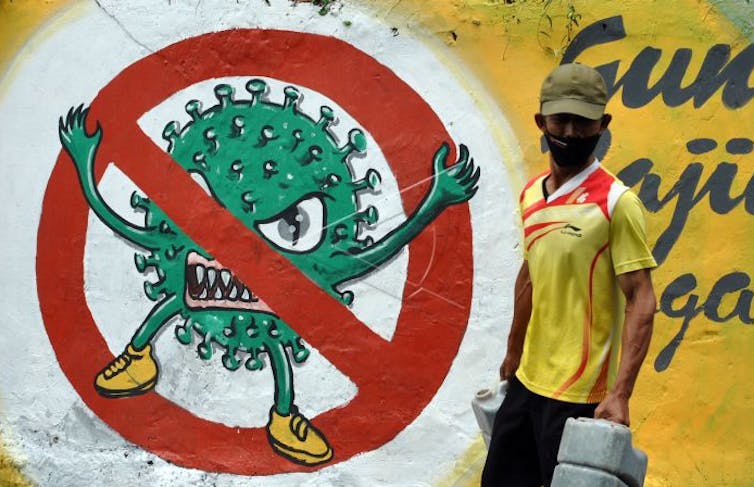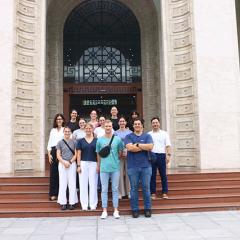
Simon Reid, The University of Queensland; Alexandra Robbins-Hill, The University of Queensland; Ansariadi, Universitas Hasanuddin, and Sheleigh Lawler, The University of Queensland
Just like many countries, the Indonesian government imposed control measures to reduce the spread of the coronavirus, including social distancing, mandatory mask wearing, self-isolation, handwashing, using hand sanitiser, cleaning surfaces, and being vaccinated.
But for many people in Indonesia, a densely populated island country, these measures might be difficult to follow as people have different living situations and health literacy.
We are researchers in public health and health behaviour. In July 2021, we conducted a survey of 602 people from two provinces in Indonesia – the capital city of Jakarta and the South Sulawesi province.
We found different levels in adherence to COVID-19 measures between residents of Jakarta and South Sulawesi. We also found different levels of knowledge, attitudes and practice, and trust in government towards COVID-19 policies.
We found more people in Jakarta complied with government control measures by practising “safe” protective behaviours, and have correct science-based beliefs than people in South Sulawesi.
The difference, according to the study, was apparently affected by their levels of health literacy and trust towards the government.
Our study found that a higher proportion of people living in Jakarta reported wearing masks when meeting people, maintaining social distancing, wiping or sanitise surface, and washing hands frequently than than those living in South Sulawesi.
There were also more respondents living in Jakarta planning to get vaccinated, compared with respondents in South Sulawesi.
In South Sulawesi, meanwhile, we found a higher proportion of people reported leaving their house to travel and visit friends that lived far away. They also reported higher rates of participation in behaviours deemed risky for the transmission of COVID-19.
Higher compliance due to higher health literacy
Our findings indicate that individuals with higher levels of literacy and education who display more accurate beliefs are more likely to comply with COVID-19 protective behaviours.
Our study found that respondents living in Jakarta reported higher levels of health literacy, compared to respondents in South Sulawesi.
Health literacy is how people access, understand, and use health information and services to make decisions for themselves and for others. It is often supported by higher levels of education and income – which was seen in our respondents from Jakarta when compared with those living in South Sulawesi.
For people living in Jakarta, higher levels of health literacy led to more accurate beliefs about COVID-19.
Our findings in Jakarta and South Sulawesi resonated with a study conducted by public health expert Kirsten J McCaffery and her colleagues that showed that people with lower health literacy were less likely to report social distancing as important in preventing COVID-19 transmission and were more likely to endorse misinformed beliefs about COVID-19 and vaccinations when compared with those with adequate health literacy. Our findings are also inline with a 2021 research conducted by Maria Joao Silva and Paulo Santos that found a better health literacy was associated with better attitudes towards preventive measures against COVID-19.
In South Sulawesi, less people trust the government
Our study also showed that people’s trust in government influences their perception in regards to risks and compliance with public health directives.
Participants in Jakarta reported higher levels of trust in government and lower levels of negative responses towards the government’s control. They believed that the government’s health protocol worked effectively to curb the spread of COVID-19.
Meanwhile, participants from South Sulawesi reported low trust in central government. Digging deeper, we found that the low trust was triggered by political instability and the inherent complexity of the local government structures.
A study by Haryanto in 2021 showed that the public confidence towards the regional government among people living in Makassar, the capital of South Sulawesi, was the lowest compared to other regions in Indonesia.
The low trust in the province explains why people were reluctant to follow government’s policies on COVID-19 safety measures and did not make a lot of effort to protect themselves, despite feeling that they were at risk from COVID-19.
Challenges for central government
It is not an easy task for all governments worldwide to ensure that citizens practice multiple new behaviours all at once, often for an uncertain period. It’s understandable. Starting a new diet is never easy.
What happened in Indonesia shows that public health communication efforts may be more effective if they move from a focus on risk, fear, and harm to more personal and familiar experiences with the disease.
In general, people take protective action based on how they think and feel about how likely they are to get infected. This risk perception is strongly linked with illness beliefs. When someone forms beliefs about an illness they think about the cause, the consequences, severity of illness and how it can be cured or controlled.
Above all, effective health communication is essential in public health response to the pandemic. Ideal messages should be accurate, consistent, and based on evidence. They need to reach large numbers of people who have trust in the source of the information in order to change their behaviour.
Our findings also highlight how important effective and consistent governance is in times of crisis. The country needs to ensure that communication activities are designed to build trust as a primary goal.
This research was funded by the Australian Government through the Australia-Indonesia Centre under the PAIR program
The Australia Indonesia Centre supports The Conversation Indonesia in the production of this article.![]()
Simon Reid, Associate Professor, Communicable Disease Control, The University of Queensland; Alexandra Robbins-Hill, , The University of Queensland; Ansariadi, Vice Dean on Academic, Research and Innovation School of Public Health, Universitas Hasanuddin, and Sheleigh Lawler, Associate Professor, School of Public Health, The University of Queensland
This article is republished from The Conversation under a Creative Commons license. Read the original article.



